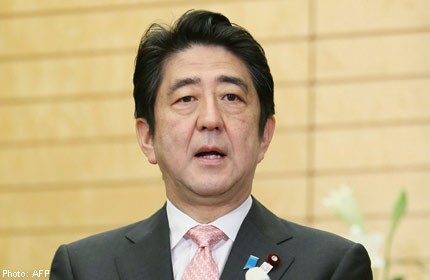Japan back in strength now: Abe

With his "Abenomics" economic policies showing early results and his party sitting on the largest parliamentary majority in six years, a confident Japanese Prime Minister Shinzo Abe told a Singapore audience that Japan's strategic and economic agenda are finally in line.
Speaking at a packed public lecture hours after arriving for an official visit on Friday, Mr Abe lamented that the weak Japanese economy, which has been caught in a deflationary spiral for 15 years, had in turn engendered feeble politics.
This in turn weakened the economy further. Japan, for many years the world's second-largest economy, is now third behind the United States and China.
"We have been experiencing a negative chain of weakening that extends to our diplomacy and national security... (but) the will to change has returned to Japan, and so has strength," said Mr Abe.
"The 'revolving door' politics with its high turnover, for which Japan is now known, has disappeared and is a thing of the past."
Most experts agree that the political opposition in Japan is currently too weak to block Mr Abe's agenda, particularly after Sunday's Upper House elections where his ruling Liberal Democratic Party (LDP) and its New Komeito ally won a resounding victory.
But they believe the jury is still out on whether the Premier and his ambitious economic agenda - a triple dose of monetary and fiscal policies and structural reforms commonly dubbed "Abenomics" - can survive the battles within the government and the LDP.
Mr Abe, in his speech, acknowledged these doubts, particularly the conventional wisdom that he would be courting political suicide if he took on the powerful agriculture and medical sectors.
He vowed, however, that he would press on with tough reforms like a "sturdy drill bit".
At an earlier press conference at the Istana with Prime Minister Lee Hsien Loong, Mr Abe pointed out that his reform agenda would not be limited to changes at home. He said he was also looking to pursue "strategic diplomacy".
The Japanese leader singled out ASEAN countries like Singapore as partners with whom Japan would like to further strengthen ties and economic collaboration.
He told reporters: "I wish to embrace the vitality of ASEAN (and incorporate it) into the revitalisation of the Japanese economy."
On the bilateral front, Mr Abe and Mr Lee reaffirmed the countries' warm ties, adding that they were looking for more opportunities to work on joint projects in third countries. For instance, Singapore and Japan recently co-organised a workshop to promote connectivity and public-private partnerships in the Mekong region. Firms from both countries are also jointly building an industrial township in Chennai, India.
Mr Lee remarked that it was a "good sign" Mr Abe was visiting Singapore and South-east Asia so soon after his successful election, adding: "We are very happy to develop the relationship and we think our ASEAN partners would also be very eager to do so."
Mr Abe left Singapore last evening for the Philippines, the final stop of his three-nation South-east Asia trip. This is his third trip to the region since taking office in December.

Get a copy of The Straits Times or go to straitstimes.com for more stories.